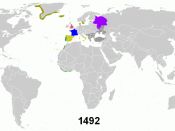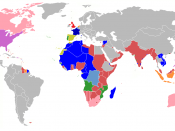Liz Pecan
ANTH 012
11/3/2013
Essay 2
Colonization and Industrialization:
The overall effect on Globalization
Throughout history, various powers have expanded and exerted control onto what they deem to be lesser civilizations. As the world continues to change and grow, the impact of past formative processes continues to be seen in the current globalized world. There is a growing literature for the last few decades on globalization and on its origins, structures, actors, facilities, politics, economy, benefits and risks. Globalization often refers to the borrowing, melding, and adaptation of outside influences into new lands. The origins of globalization, and therefore its current status, are residual effects of the most powerful constituents that began connecting the world on a large scale. Colonization and industrialization, two intertwined processes that are historically related, are the primary processes that began expanding the connected nature of the current world. They serve as vectors for the introduction of new characteristics, albeit both of these processes work in different ways that contribute to globalization.
The impact, and therefore significance, of the processes of both colonization and industrialization as connected to globalization can be seen through the historical lens of society. [1: Yale University, "The History of Globalization," The History Of Globalization.][2: Ibid. ]
Colonization, or the act of creating a colony in (or on) a place, is one of the earliest processes that utilizes the spread of a various characteristics associated with globalization. The colonization process involves the establishment, exploitation, maintenance, acquisition and expansion of colonies in one territory by another territory, and often results in an unequal relationship between these two actors. Colonization by a dominant power of a subordinate society allowed the colonizer to project its own pervasive identifiers onto the subject. Throughout the period of greatest colonial expansion, predominantly utilized by...


